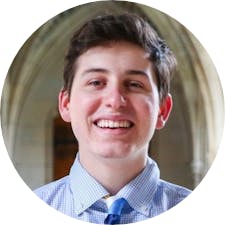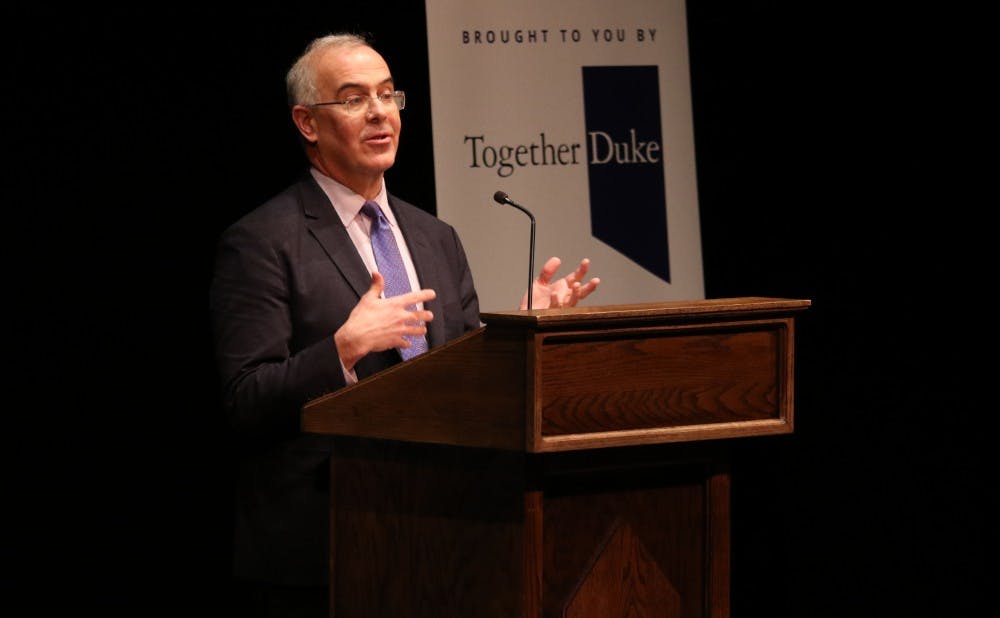Author, commentator and New York Times columnist David Brooks is not a stranger to Duke—he was once a visiting professor at the Sanford School of Public Policy, and yesterday he was the keynote speaker at this year’s Provost Forum.
Focusing on the forum's theme, “Testing the University: Speech, Freedom and Civility on College Campuses,” Brooks spoke on the connections between civil debate, university culture and culture in our society at large.
“Cultural progress moves forward by a pattern of ‘ratchet, hatchet, pivot, ratchet,’” he said, by which he meant that people build a culture that works for a while, and when it stops fitting the needs of the people, they “take a hatchet to it” and replace it.
Brooks claimed that we are in a hatchet period today. The individualistic, expressive culture that began in the 1960s has led to loneliness, crisis of purpose and tribalism, he said, fueling the rise of populists such as President Donald Trump.
“The core of life is conflict and combat, it’s a warrior mentality, everything is zero-sum, politics is war...society is tribal,” Brooks said in regards to the tribalistic mentality. “And you see it in the impulse to erect barriers, to build walls, to silence enemies. Mistrust is the worldview—it’s true on the right, often out in the country, and it’s true on the left, often in campuses.”
To return away from tribalism, there needs to be shifts in the ideals of universities and in people’s approach to the world, Brooks said.
He discussed his undergraduate experience at University of Chicago—where he majored in “history and celibacy”—and how he admired its humanistic model of forming each student’s character through philosophy and civic moral debates.
Brooks continued that he wished today’s universities would return to that ideal instead of focusing on specialization and research, which leave students with their “deep moral yearnings” unfulfilled. When people are unfulfilled, some will mistakenly believe that they can find their spiritual fulfillment in politics, leading to disillusionment, fanaticism and tribalism.
However, Brooks implored the audience to not lose faith in our ability to craft a better culture. All that people need to do, Brooks concluded, is reject hatred and embrace commitment.
“When you organize your life around love and commitments… you start from the premise that 'I don’t know who this person is on campus, but I know in some way they’re my brother and sister and I will listen to them,'” he said.
To Brooks, commitment is love—it is offering something without expecting to get anything in return and building structures that ensure that love will not falter. Tribalism, on the other hand, is based less in love for one’s tribe but in hatred for others. Fixing our culture requires civil debate and respecting each other’s different points of view, which both require love, Brooks added.
There are people and organizations committed to fighting back against the negative aspects of our culture, Brooks said, but there is still progress to be made. Movements need to centralize and articulate what they are actually for, not just what they are against. They need to understand that democracy is more than just voting representatives into office, it is a way of life. And most importantly, Brooks said they need to prioritize personal growth.
“Social transformation follows personal transformation,” he said. “You have to give people a way to live and improve their own lives at a higher level in order to create social transformation. That’s what has to happen—change is not just out there, it has to happen within us that we live in a way that respects the values that we cherish.”
Get The Chronicle straight to your inbox
Signup for our weekly newsletter. Cancel at any time.

Jake Satisky is a Trinity senior and the digital strategy director for Volume 116. He was the Editor-in-Chief for Volume 115 of The Chronicle.

